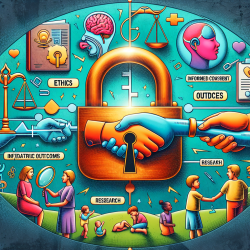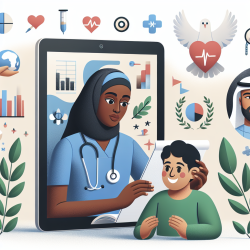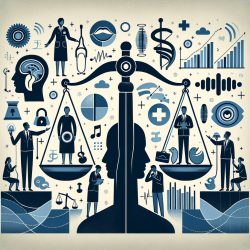Introduction
As a speech-language pathologist dedicated to improving outcomes for children, the ethical use of health data is crucial. The research paper "Facilitating the ethical use of health data for the benefit of society: electronic health records, consent and the duty of easy rescue" provides valuable insights into navigating the ethical landscape of electronic health records (EHRs). This blog will explore how practitioners can leverage these findings to enhance their practice and encourage further research.
The Ethical Landscape of EHRs
Electronic Health Records (EHRs) offer immense potential for advancing healthcare research and improving patient outcomes. However, they also pose ethical challenges, primarily around informed consent and patient confidentiality. The research highlights a significant tension between the need for data to drive research and the ethical obligation to protect patient privacy.
Understanding the Duty of Easy Rescue
The concept of the "duty of easy rescue" is central to the research. It posits that individuals should help others when it can be done with minimal risk to themselves. In the context of EHRs, this principle supports the idea that sharing data for research purposes can be ethically justified if the risks are minimal and the potential benefits are significant.
Implementing Ethical Data Use in Practice
For practitioners, implementing ethical data use involves:
- Risk Assessment: Evaluate the potential risks associated with data sharing and ensure they are minimal. This involves robust data security measures and anonymization techniques.
- Informed Consent: While informed consent is crucial, the research suggests that for minimally risky research, consent requirements can be relaxed if public benefits significantly outweigh the risks.
- Public Education: Engage in public outreach to educate stakeholders about the benefits of EHR-based research and the safeguards in place to protect patient data.
Encouraging Further Research
The paper advocates for a risk-adapted framework that facilitates the ethical use of EHR data. Practitioners are encouraged to explore this framework and consider how it can be applied in their settings. Further research is needed to refine these guidelines and ensure they are adaptable to different contexts.
Conclusion
The ethical use of EHRs is a complex but essential component of modern healthcare research. By understanding and implementing the principles outlined in the research, practitioners can contribute to a more ethical and effective use of health data, ultimately improving outcomes for children and society at large.
To read the original research paper, please follow this link: Facilitating the ethical use of health data for the benefit of society: electronic health records, consent and the duty of easy rescue.










